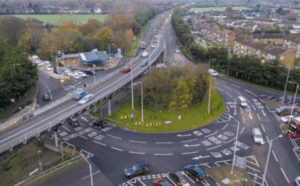Transport for London has launched a major new innovation challenge, RoadLab 2.0, looking to work with the private sector to develop new ways of tackling some of the issues caused by roadworks for construction and utilities work.
The programme is being funded by TfL’s Lane Rental Scheme, which charges utility companies and TfL contractors for digging up roads at the most traffic-sensitive times and locations.
TfL says ensuring that London’s roads operate safely and effectively is vital to ensuring a cleaner and more sustainable transport network for everyone who lives and works in the capital. In 2019, TfL launched an innovation challenge called RoadLab, that called on the UK’s leading innovators to develop technology that could make roadworks in the capital safer, smarter and more accessible. RoadLab 2.0 will build on the success of the original RoadLab challenge, this time focusing on improving portable traffic signals to reduce congestion and looking at ways in which TfL can better use data on walking and cycling in London to plan roadworks.
Portable traffic signals are used for temporary traffic management on roads. Roadworks carried out for construction and utilities work are responsible for 80 per cent of bus delays. If portable traffic lights are not properly set up for changing traffic conditions, they can cause further delays for everyone who uses the roads. More than 20,000 portable signals are used yearly in London, which results in thousands of hours of lost productivity, wasted time and excess carbon emissions and pollution. TfL is looking for innovative solutions that will make roads more efficient by reducing delays caused by the signals and make them more reliable.
TfL is also asking innovators for ideas to make walking and cycling in the capital safer and easier, by using data to plan roadworks around people walking and cycling. More Londoners than ever before are walking and cycling to get around the city, and some cycling routes are seeing as much as a 200 per cent increase in use. Though data is gathered about the numbers of people walking and cycling, planning for people carrying out these journeys could be further improved through the use of data. Solutions could include better real-time data about these journeys to help better plan roadworks in future.
TfL says running an innovation challenge like RoadLab 2.0 allows it to harness some of the best ideas from innovators, encouraging innovation from start-ups or large companies without hampering competition or transparency.
The deadline for applying is midday on Friday 23 December 2022. The innovators chosen to take part in the programme will receive up to £20,000 of funding to enter a 12-week trial phase, with access to TfL expertise to help them develop their products for us on London’s roads. Products that are shown to work effectively may then be provided further funding in future to help make the capital’s roads safer and more efficient for everyone.
Rikesh Shah, TfL’s Head of Open Innovation, said: “I am incredibly excited that we’re launching RoadLab 2.0. We want to continue working with a diverse range of the best market innovators to solve some of London’s key challenges. We’ve proven through FreightLab and RoadLab 1.0 that working openly in partnership with innovators brings in new ideas at scale, and I’m keen we harness the ideas, skills and energy of the market to help us make London’s roads safer and more accessible for sustainable travel. I’d encourage anybody with a great idea to apply to RoadLab 2.0 and take part in our latest innovation challenge.”
TfL is already using innovative solutions from the first RoadLab challenge to cut congestion, including simulation technology to model roadworks and artificial intelligence software that uses anonymised social media data to detect emerging disruptions.
TfL’s last innovation challenge, FreightLab, has finished most of its trials, with some trials chosen to be extended and others which have entered into commercial agreements with FreightLab Partners. A trial with EMSOL and Guy’s & St. Thomas’ NHS Trust has been shortlisted for the CiTTi awards for its innovative approach to tackling air pollution around cities.
(Picture – TfL)
























